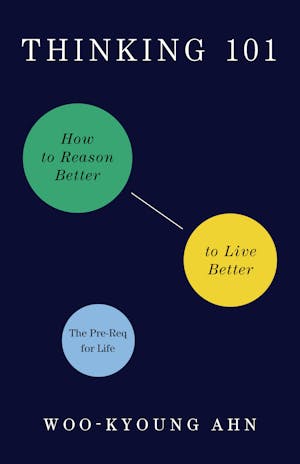Woo-kyoung Ahn is the John Hay Whitney Professor of Psychology at Yale University. After receiving her Ph.D. in psychology from the University of Illinois, Urbana-Champaign in 1990, she was assistant professor at Yale University and associate professor at Vanderbilt University.
Ahn has been teaching her courses on thinking for over 30 years. She has consistently received one of the highest course evaluation ratings from the students in any university she taught. In 2022, Ahn received Lex Hixon Prize for teaching excellence in the social sciences. This is the highest honor in teaching at Yale University. In 2019, her “Thinking” course was the most popular course at Yale University, drawing over 450 students. She published a book, titled Thinking 101: How to think better to live better, based on some of the lectures covered in the course.
For her research, Ahn has been studying thinking and reasoning, such as causal learning, concepts, judgments, and inferences. She studies not only basic research but also applied issues. Applied issues include mental health clinicians and laypeople conceptualize mental disorders and how genetic attributions of mental disorders can mislead us. Her research on thinking biases has been funded by the National Institutes of Health. She is a fellow of the American Psychological Association and the Association for Psychological Science.
Read more about Woo-kyoung Ahn in her CV.
Download Bio
 HARDCOVER
|
Thinking 101How to Reason Better to Live Better
Flatiron Books
Psychologist Woo-kyoung Ahn devised a course at Yale called “Thinking” to help students examine the biases that cause so many problems in their daily lives. It quickly became one of the university’s most popular courses. Now, for the first time, Ahn presents key insights from her years of teaching and research in a book for everyone. |
What Can Go Wrong in Clinicians’ and Clients’ Minds When Mental Disorders Are Biologically Explained…And What Can Be Done About It Mental disorders are increasingly understood in terms of biological mechanisms. What are psychological consequences of explaining Major Depression, for instance, in terms of chemical imbalance or genetic predisposition rather than traumatic, stressful events? It has been generally considered that biological explanations for mental illnesses would reduce blame on those who suffer from them. However, we discovered a number of unintended negative consequences of construing mental disorders in terms of biological mechanisms. This talk will review some of these pitfalls and ways to avoid them from the clinicians’ and patients’ perspectives.
Check out Woo-kyoung Ahn’s personal author page.
Check out this article on Woo-kyoung Ahn in Yale Alumni Magazine.
Listen to Woo-kyoung Ahn’s interview on Armchair Expert.
Listen to Woo-kyoung Ahn discuss subconscious ways of thinking on KERA Think.
Listen to Woo-kyoung Ahn discuss lessons of psychology on The Colin McEnroe Show.
Check out Woo-kyoung Ahn discussing the power of graphic imagery on WIRED.
Woo-kyoung Ahn discusses three common thinking traps and how to avoid them on NPR Life Kit.
—Low Country MH Conference clinician
“I have become one of your fans. I really enjoyed your presentation, your knowledge, and your personality of humbleness.”
—Low Country MH Conference clinician
Praise for Thinking 101 “An INVALUABLE RESOURCE to anyone who wants to think better.”
—Gretchen Rubin
Award-winning YALE PROFESSOR Woo-kyoung Ahn delivers “A MUST-READ—a smart and compellingly readable guide to cutting-edge research into how people think.”
-Paul Bloom
“A FUN exploration.”
—Dax Shepard

